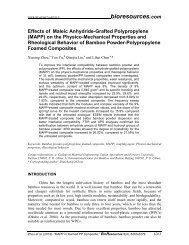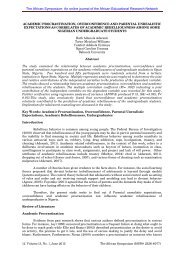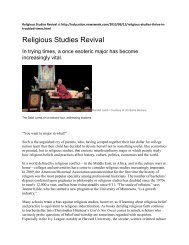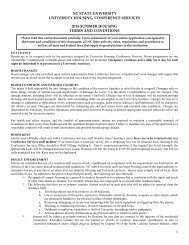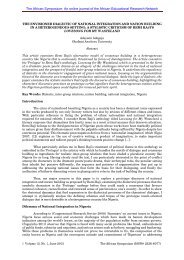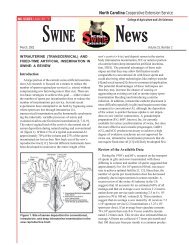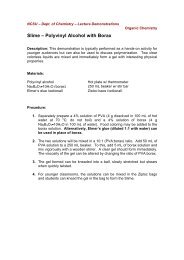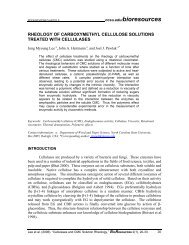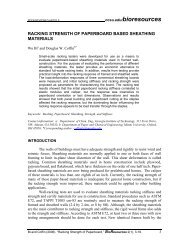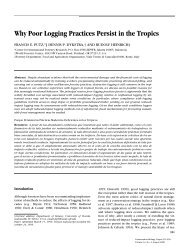Dictators, Songwriters, and the Negotiation of Censorship
Dictators, Songwriters, and the Negotiation of Censorship
Dictators, Songwriters, and the Negotiation of Censorship
You also want an ePaper? Increase the reach of your titles
YUMPU automatically turns print PDFs into web optimized ePapers that Google loves.
Wilson<br />
literal discourse that was being appropriated by <strong>the</strong> regime, <strong>and</strong> toward a<br />
more oblique <strong>and</strong> suggestive poetic discourse, that at times was almost like<br />
code. As <strong>the</strong>se artists refined <strong>the</strong>ir work, lyrics became more polished.<br />
Though <strong>the</strong> crackdown silenced many voices, I argue that as a result <strong>of</strong><br />
“negotiation” with <strong>the</strong> censors, some artists became masters <strong>of</strong> lyric<br />
expression. Their lyrical works actually improved as a result <strong>of</strong> government<br />
intervention. Clearly, this phenomenon—that <strong>of</strong> censorship necessitating a<br />
greater lyrical flexibility—is not entirely without precedent. But as will be<br />
seen, <strong>the</strong> scope <strong>and</strong> <strong>the</strong> ramifications <strong>of</strong> this particular historical event<br />
make it a special case, <strong>and</strong> its outcome would determine <strong>the</strong> fate <strong>of</strong> an<br />
entire generation, as well as that <strong>of</strong> its culture.<br />
It was not just artists that were thrust to <strong>the</strong> fore: <strong>the</strong>ir medium also<br />
enjoyed a huge increase in popularity. For many, Argentine rock is simply<br />
an integral part <strong>of</strong> mainstream culture; so much so, that <strong>the</strong> genre is now<br />
generally known as rock nacional. But it has not always enjoyed such<br />
cultural legitimacy. At first locally performed rock was seen as a poor copy<br />
<strong>of</strong> Anglo-American styles: it was “foráneo” <strong>and</strong> “cursi” (Dente 17).<br />
Never<strong>the</strong>less, in a very few years rock music in Argentina moved from only<br />
marginal acceptance to being considered an important expression <strong>of</strong><br />
national culture. This shift is paradoxically due in great part to its rejection<br />
<strong>and</strong> suppression by <strong>the</strong> dictators.<br />
As we know, <strong>the</strong> creation <strong>of</strong> meaning in any text is a complex<br />
process, requiring <strong>the</strong> interaction <strong>of</strong> <strong>the</strong> reader, <strong>and</strong> taking place within a<br />
system <strong>of</strong> societal <strong>and</strong> economic pressures <strong>and</strong> dem<strong>and</strong>s. Of course, any<br />
form <strong>of</strong> cultural production is read <strong>and</strong> undergoes <strong>the</strong> same process,<br />
though as scholars such as Frith, Middleton <strong>and</strong> Aparicio have shown, <strong>the</strong><br />
highly personal <strong>and</strong> interactive nature <strong>of</strong> events involving musical texts<br />
accelerates <strong>and</strong> intensifies this process, making such events a very<br />
noticeable symbolic site for negotiating issues <strong>of</strong> <strong>the</strong> society. Salsa, for<br />
example, has become a nucleus for sociomusical strategies to deal with<br />
gender <strong>and</strong> race stereotypes, as well as <strong>the</strong> market pressures <strong>of</strong> capitalist<br />
society (Aparicio 84). However, ano<strong>the</strong>r factor that accelerates <strong>the</strong> growth<br />
52



